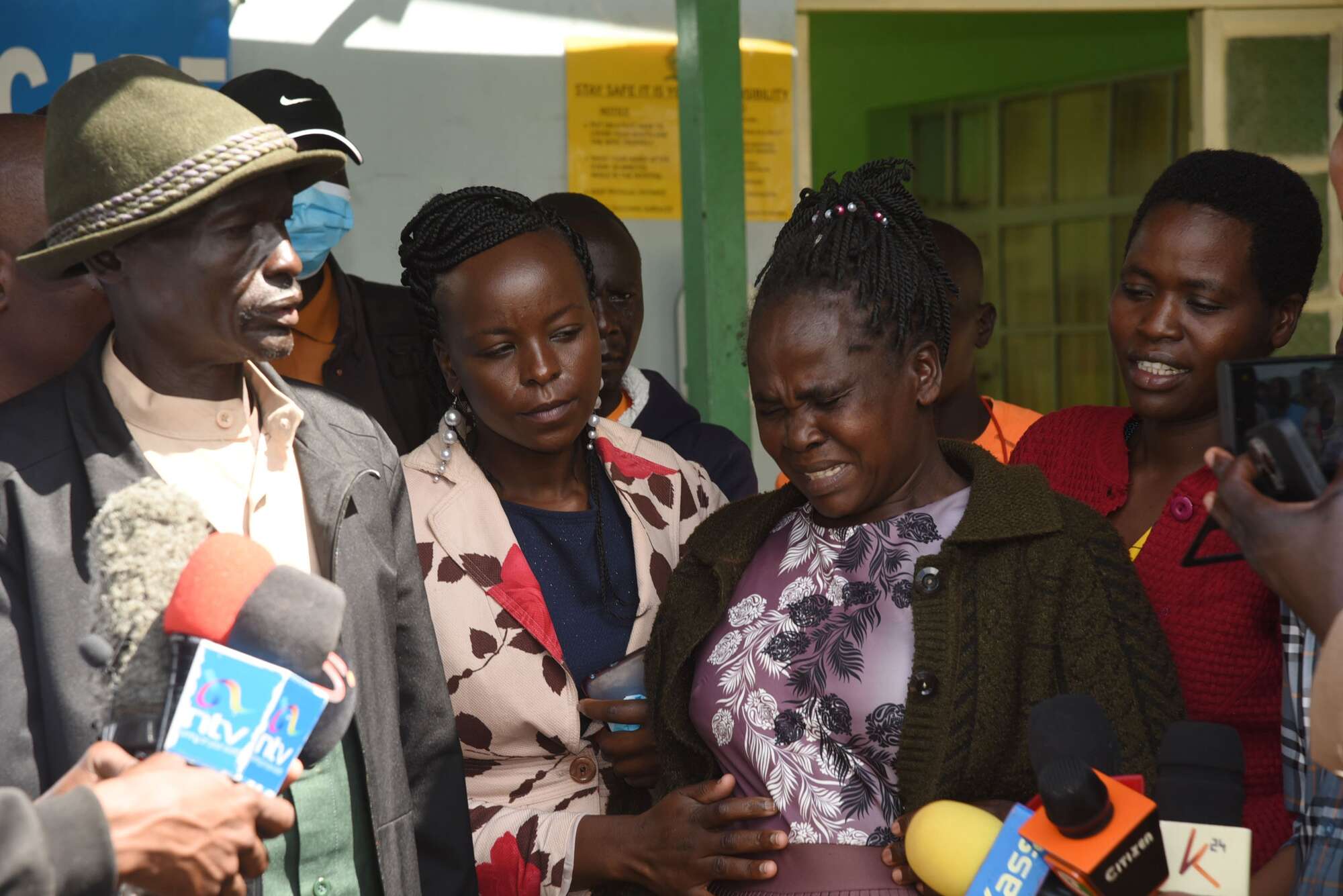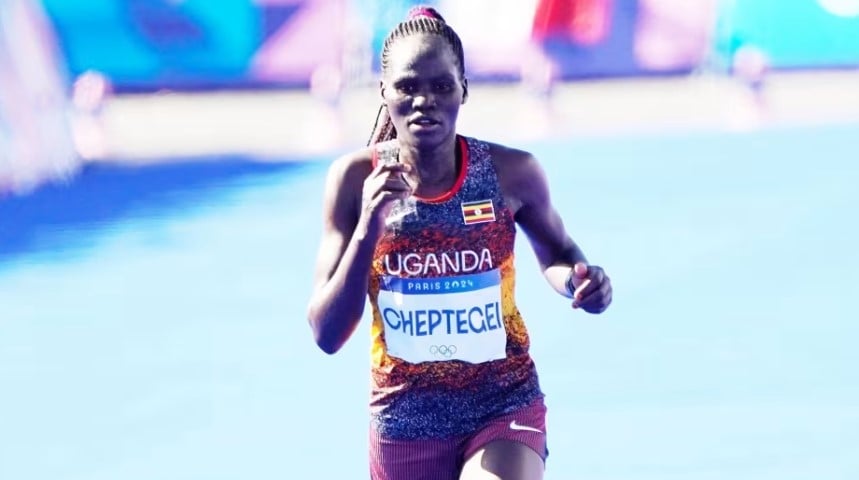
Agnes Cheptegei mourns next to the coffin of her daughter and Olympian Rebecca Cheptegei, who died after her former boyfriend doused her in petrol and set her ablaze, at the Moi Teaching & Referral Hospital (MTRH) funeral home, in Eldoret. Cheptegei was buried on September 14 in Bukwo District, Uganda. PTOTO/REUTERS
Before the September 14 burial of Ugandan athlete Rebecca Cheptegei at her ancestral home in Bukwo District in Eastern Uganda, pleas were being made for some kind of desperate implementation to end Gender-Based Violence (GBV) being directed towards successful female athletes.
Cheptegei, a Ugandan national, who lived and trained in the highlands of western Kenya, succumbed to multiple organ failure after sustaining 80 percent body burns following an altercation with ex-boyfriend Dickson Ndiema Marangach who doused her in petrol before setting her ablaze.
According to the late’s father, Joseph Cheptegei, the two disputed over a piece of land, which rightfully belonged to his daughter, Rebecca.
“I wonder why he wanted to take away things belonging to my daughter,” Cheptegei spoke of his daughter’s property before Kenya’s media, shortly before her death.
Cheptegei’s brutal death came two years after another athlete Kenyan born-Bahraini Damaris Muthee Mutua, was in 2022 found dead in Iten town, a running paradise for athletes in Kenya.
Prior, in 2021, another runner Agnes Tirop had been found knifed to death at her home, still in Iten town. The two deaths were also linked to gender-based violence with the occurrence of Cheptegei’s death recently re-kindling the date on the subject.
Situation back home
Worldwide, including in Uganda, the attack on Cheptegei touched the emotional nerves of many. The government, activists, women-affiliated organisations, and respective sports bodies all came out in arms to condemn brutal actions of violence against excelling women.
“...May you fire us up with anger to fight and end violence against women and girls,” the Joint United Nations Programme on HIV/Aids (UNAIDS) Executive Director Winnie Byanyima posted about the incident on her social media platform X, on September 5.
Women’s Rights Lead at ActionAid Uganda, Ms Angella Akoth, who doubles as the organisation’s National Coordinator for Gender-Based Violence Shelter programmes, told Daily Monitor last Sunday that Cheptegei’s death, which caught global attention, is a humbling reminder of how also vulnerable successful women are in their respective careers.
“With the kind of work we do [at ActionAid] around gender-based violence and its shelters, for the cases of Kampala, we have around a 48 per cent rate of intimate partner violence on successful women with the cases all pointing to power relations, finances and insecurity,” Ms Akoth said.
Domestic Violence is caused by disputes over family property, failure to provide for the family, drug and alcohol abuse, and cases of infidelity, states the 2023 Uganda Police Force annual crime report.
A total of 14, 681 cases of domestic violence were reported to police in 2023 compared to the 17, 698 cases reported in 2022.
By the end of 2023, the annual crime report elaborates, 1,520 cases of domestic violence were taken to court, out of which, 423 cases secured convictions, 25 cases were acquitted, 183 cases were dismissed while 889 cases are still pending in court. A total of 15,184 people were victims of domestic violence, of whom 3,243 were male Adults, 10,792 were female adults and 505 were male juveniles while 644 were female juveniles.
The police have, however, sometimes been blamed for dragging its feet when it comes to resolving domestic violence matters. Speaking on condition of anonymity, some women told Daily Monitor that they have previously reported their abusive partners to police who many times end up doing nothing about their cases.
“I remember one male officer who teased me after I reported a previous domestic violence incident,” the woman told Daily Monitor, adding, “the officer said, ‘what kind of wife brings bedroom matters to the public?’ ‘Which other man will marry you? Go back home and cook for your husband.”
Speaking to Daily Monitor on Sunday, police spokesperson Kituuma Rusoke acknowledged that handling domestic violence is complex work even for them as police officers.
“It [domestic violence] is a highly emotional subject as these are incidents within homes and among partners,” Rusoke said.
“One of the biggest challenges is that you may find an officer [on duty] not either trained or conscious enough to treat the matter urgently as a domestic violence issue. The officer may be having some kind of stereotype and may take the domestic case lightly,” he added.
The other challenge police said it is grappling with in handling domestic violence matters is that many couples in these cases always end up reconciling.
“We have had those situations where we go and are determined to arrest a man who has brutalised his wife. Once apprehended, there are women who tell us, ‘just threaten him,’ Then, there are women whose partners are detained and taken to court, they will later find all avenues that the accused is released including standing as a surety for him,” Rusoke explained, adding, “So, in such a situation, the police officer does not become the only problem, the suspect and the entire homestead become part of the problem in solving the matrix.”
To combat the issue, Rusoke says police officers are currently receiving training on how to best handle domestic violence cases reported to them.
Men vs successful women
Athletes are not the only women falling into the deadly traps of jealous and insecure men. High-flying female politicians, lawyers, musicians, chief executives, name them, have also fallen victims to predatory men.
As a precautionary measure, some of these end up becoming very selective when it comes to choosing partners to get someone very understanding.
During a 2020 visionaries tour where media personality Oprah Winfrey was interviewing different celebrities on their personal lives, famous singer Jennifer Lopez, commonly known as JLO, was asked a particular question on why she settled for then choice of boyfriend, retired professional baseball player Alex Rodriguez.
“...He wants to build together, which I have never had [in a relationship]. I have never had somebody who wants to see me shining, and growing. Him being in my life is a big part of what happened this year because he allowed me to kind of [fly- a gesture Lopez makes with both arms] and was not like ‘get back down here’,” a smiling Lopez said of Rodriguez.
Oprah interjected: “Or don’t outshine me,” Oprah complemented on Lopez's remarks.
he conversation between the two women carried on with Winfrey herself admitting that her own partner Stedman Graham backed her career.
“He always wants the best for me…You want someone who wants the best for you,” Winfrey told Lopez who complimented on the remarks saying, “….and even sees more potential in you than what you see in yourself. That thing.”
Of such relationships, Principal Counselling Psychologist at Gulu University Grace Yumah Nalubowa said this is how things should be among couples.
“Men ought to be the number one cheer leaders for their partners. It benefits both parties, both at the family level and in society,” Nalubowa said, “But many times, it is not the case. Most husbands are afraid of their wives outshining them. It may be a thing about their ego, their competitive personality, or depending on how they were raised. A man’s background may contribute towards them being violent, in the long run.”
Ms Elizabeth Kemigisha, the advocacy and communication manager of the Uganda Association of Women Lawyers (Fida-Uganda), a non-governmental organisation that advances women’s rights and advocates for justice, said becoming empowered women does not necessarily mean that they will not be subjected to domestic violence.
“We still live in a patriarchal society, with still a whole hierarchy in relationships and it is the one reason why violence continues to be fostered. The women [as society dictates] are expected to be below the man, even in earnings,” Ms Kemigisha said.
Society, Ms Akoth elaborates, already has parameters on who a woman should be.
“Our boys are taught to be men and this means, being a decision maker, leader, person to take charge of things, the person to tame the woman,” Ms Akoth said.
“From our interactions with affected women [during the line of work], they say that men [who have abused them] always want to be seen as in charge or in-control, leaders, decision-makers, and determinants of resources. And when they see these women growing in their respective careers, that come up and trim their wings afraid they will lose control over them,” she added.
Way forward
“Never keep quiet when violated in a relationship. Silence is never a solution,” Rusoke advises women.
At the police level, Rusoke advises affected women to always consult other police officers in case the one they have reported the case to is not helping them resolve their problem.
“If you feel police officer X is not helping you, involve another second or third police officer,” he advised women.
On her part, Ms Nalubowa also advises women to seek the services of a professional counsellor once their partner becomes abusive either emotionally or physically. For those who cannot afford the services of a professional counsellor, she recommends talking to a trusted family member or friend about their issue.




